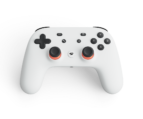UK Games Market Grows 10% Through 2018, Hitting £5.7bn Value
by on 4th Apr 2019 in News


The United Kingdom's games sector appears to be in rude health. As part of this week's ongoing London Games Festival, it was revealed that the UK games market enjoyed 10% year-on-year growth through 2018.
UK games industry trade body Ukie also revealed that the growth saw the UK consumer games market reach a record £5.7bn value in 2018.
Ukie's figures also show that game software revenues in the UK cleared £4bn for the first time in 2018, climbing 10.3% year-on-year to £4.01bn. Game hardware revenues in the UK, meanwhile, rose 10.7% year-on-year to a record high of £1.57bn.
Interestingly, Ukie's valuation included consumer spend on game-related culture more broadly; think merchandise, gaming books, and so on. That analysis added £109.6m to the total value.
“2018 has been another record year for the UK games industry", enthused Dr Jo Twist OBE, CEO of Ukie. "Both software and hardware markets have seen steady growth; with the software sector’s digital, online, and mobile sales all increased over the 12 months; and the hardware market seeing significant gains across PC game hardware, peripherals, and accessories. The UK games industry is a cornerstone of the country’s cultural landscape and continues to work hard to create new, innovative, and exciting content that consumers want to experience – and that helps to drive the industry forward year-on-year.”
Breaking the numbers down, there's a great deal more to be learned. Pointing to data from IHS Markit, Ukie confirmed that revenues for digital and online games in the UK rose 20.3% through 2018, making up of £2.01bn of the total market value.
A statement to the press confirms: "While this figure includes full-game downloads, DLC, and in-game transactions, the success in 2018 of online-only games like PlayerUnknown’s Battlegrounds and Fortnite have helped push this segment up to encompass 50% of all UK software revenues. Further analysis from IHS Markit showed a buoyant mobile market, with 8.2% uplift to £1.17bn."
While there are plenty of reasons to be cheerful, gaming in its entirety didn't universally enjoy significant growth. Following 2017's modest uplift in the sales of boxed gaming software, through 2018 physical releases saw a slight decline. A drop of -2.6% meant boxed game revenues fell to £770m. That's by no means a cliff edge drop; but at best physical sales are holding steady, if you consider the numbers over a handful of years. Pulling on data from Kantar Worldpanel, Ukie also reported UK pre-owned game sales declining -30.8% year-on-year in 2018, citing the expanding free-to-play and digital spaces as part of the reason. Pre-owned game sales are a divisive issue in the games industry; some will perhaps see the decline of secondhand boxed games as a positive story for sales of new titles; be they digital or physical.
IHS Markit data also pointed to a -20.9% drop in the VR hardware market, with the value landing at £72m. The press statement points to consumers waiting for the next generation of headsets. Many expect to see more powerful, flexible, and affordable VR hardware options in the coming months and years.
Lastly, despite access to games through plenty of non-devoted hardware such as mobile, browser, and smart TVs, dedicated gaming hardware did reasonably well in the UK through 2018. Game consoles sales climbed 6.5%, banking £702m, while PC gaming hardware surged forward by 18.4% to £445m. Peripheral and accessories, meanwhile, climbed 19.9%, reaching £355m.
Back in the 'great recession' of 2008, games generally weathered the storm. Through 2018, of course, uncertainty around Brexit bred caution through many industries. It appears, however, that in uncertain times the UK games sector – and the consumers who support it – are making sure interactive entertainment continues to thrive.
App StoresAudienceDataDeveloperEMEAGamingMobileMonetisationPlayersPublisherTechnology







Follow TheGamingEconomy